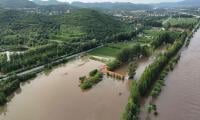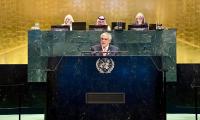In a detailed 43-page report released by the Office of the United Nations High Commissioner for Human Rights (OHCHR), once again the agency has called on India to investigate grave human rights offences in Indian-held Kashmir. The report states that these offences accelerated following the killing of Burhan Wani in 2016. The third death anniversary of Wani was marked across Held Kashmir on Monday. The report, which calls for an independent international investigation into rights abuses in Kashmir, has not gone down well with the Indian government. A commission of inquiry is one of the UN’s highest levels of probes, generally reserved for major global crises. Since 2018, UN reports have been demanding an international investigation into abuses in the valley.
The latest report also calls for an end to special laws which give members of the Indian armed forces controversial authority in the held valley under the Armed Forces Special Powers Act. This makes accountability for rights violations in Kashmir almost impossible and no security personnel have been tried for such abuses since the law came into place. It has been criticised by human rights activists in India and around the world.
There has also been concern expressed in the report about accelerated violence since the Pulwama attack and the consequent skirmish between India and Pakistan early this year. According to the Jammu Kashmir Coalition of Civil Society, 586 people were killed last year – the highest figure since 2008. Since the uprising following the death of Wani, at least 100 protesters were killed in five month-long street protests and others injured by rubber pellets. The UN states that, following heightened tensions after the February suicide bombing, there has been an expansion in human rights abuses inflicted on civilians. These include arbitrary detention of political dissidents and prominent civil society personalities. It is essential the world take action rather than watching while
the misery of the Kashmiri people continues unchecked. Most disturbing however is India’s blanket rejection of the UN report as ‘false’ and ‘motivated’. This essentially means India has no intention of tackling the problem. India has consistently prevented international monitors from visiting the area and this in itself points to a reluctance for the truth about Kashmir to be made known to the world.
Police officials baton charge and fire tear gas to repel angry mob at Charsadda road in Peshawar on November 19, 2024....
CJP Justice Yahya Afridi. — SC website/FileChief Justice of Pakistan Yahya Afridi’s unveiling of a comprehensive...
A Pakistani paramedic examines a child at a medical camp in Jamshoro district of Sindh province. —AFPMore than five...
A representational image of a transmission tower, also known as an electricity pylon. — AFP/FileOne of the most...
The representational image shows female students taking computer classes at a digital skill training institute on...
United States Secretary of State Marco Rubio and Foreign Minister Ishaq Dar. —Reuters/NNI/File Pakistan has...







